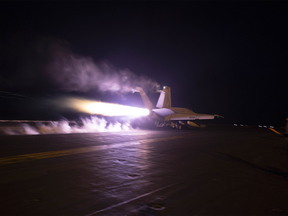Article content
A tanker operated on behalf of trading giant Trafigura Group that was carrying a cargo of Russian fuel was struck by a missile as it transited the Red Sea, in the most significant attack yet by Yemen’s Houthi rebels on an oil-carrying vessel.
“Firefighting equipment on board is being deployed to suppress and control the fire caused in one cargo tank on the starboard side,” a Trafigura spokesperson said Friday in a statement. “We remain in contact with the vessel and are monitoring the situation carefully. Military ships in the region are underway to provide assistance.”
Article content
Yemen’s Houthi rebels claimed the strike on the Marlin Luanda. The vessel is carrying Russian-origin naphtha — a product used to make plastics and gasoline — purchased below the price cap imposed by the Group of Seven nations, the Trafigura spokesperson also said.
Oil rallied to the highest price in two months after a fuel tanker was struck near Yemen, underscoring the geopolitical risks to crude supplies.
West Texas Intermediate rose to top US$78 a barrel, the highest price since November. Crude climbed more than six per cent this week — the biggest gain since the week after the start of the Israel-Hamas war.
The attack will raise fresh questions about whether oil tankers will continue to transit the Red Sea. Since joint United States and United Kingdom airstrikes on the Houthis earlier this month, tanker traffic in the region has declined, but some vessels have continued to pass through, including those hauling oil from Russia, for whom the waterway has become increasingly important since its invasion of Ukraine.
Other key oil exporters such as Saudi Arabia said this week that they were planning to continue using the route.
Article content
The latest incident also suggests that the U.S. and its allies still haven’t sufficiently degraded the Houthis’ military capabilities two weeks after launching the first of several airstrikes on the group’s missiles, radars and other assets across Yemen. Last weekend, U.S. deputy national security advisor Jon Finer said military actions to deter the Houthis and other groups backed by Iran would take time.
“Deterrence is not a light switch,” Finer told ABC. “We are taking out these stockpiles so they will not be able to conduct so many attacks over time. That will take time to play out.”
In its update on the incident, the U.K. Navy advised ships to transit with caution and said authorities are responding.
The area in question and the southern Red Sea have been the centre of multiple attacks on ships by Houthi militants in recent weeks. Since mid-November, the Houthis have launched near daily attacks on vessels transiting the waterway, in an act of solidarity with Palestinians amid the war between Israel and the militant group Hamas. The conflict has rerouted trade flows as some shippers avoid the key waterway.
Earlier Friday, missiles exploded near a Panama-flagged, India-affiliated ship carrying barrels from Russia, according to Ambrey. Although a Houthi spokesman told the Russian newspaper Izvestia last week that Russian and Chinese ships sailing through the Red Sea would be safe, Friday’s attack was the third in the vicinity of a vessel that had previously called on a Russian port.
Bloomberg.com
Share this article in your social network



